People across the 24 countries surveyed are divided in their ratings of the U.S. on a number of measures:
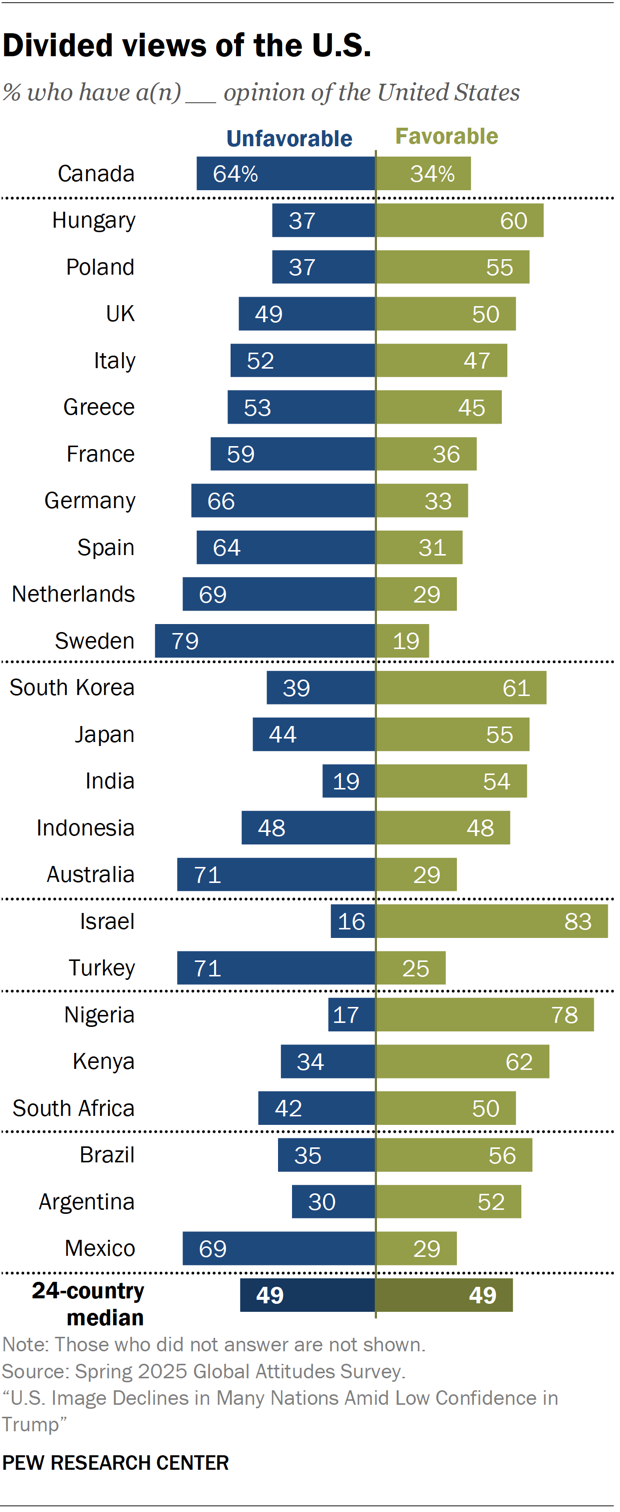
- A median of 49% of adults have a favorable overall view of the U.S. An identical share have an unfavorable view.
- People in eight countries tend to name the U.S. as the world’s leading economic power. In 12 nations, more consider China the top economy. In four, about equal shares name the U.S. and China.
- A 50% median say democracy works well in the U.S., while 46% say it works poorly. And most agree there are strong partisan conflicts in the country.
In many – but not all – of the nations surveyed, views of the U.S. have become more negative since the last time we asked.
Overall opinion of the U.S.
Roughly half of adults across the countries surveyed view the U.S. favorably. The U.S. receives its most favorable rating from Israel, where 83% see it positively.
Majorities also view the U.S. favorably in Brazil, Hungary, Japan, Kenya, Nigeria, Poland and South Korea.
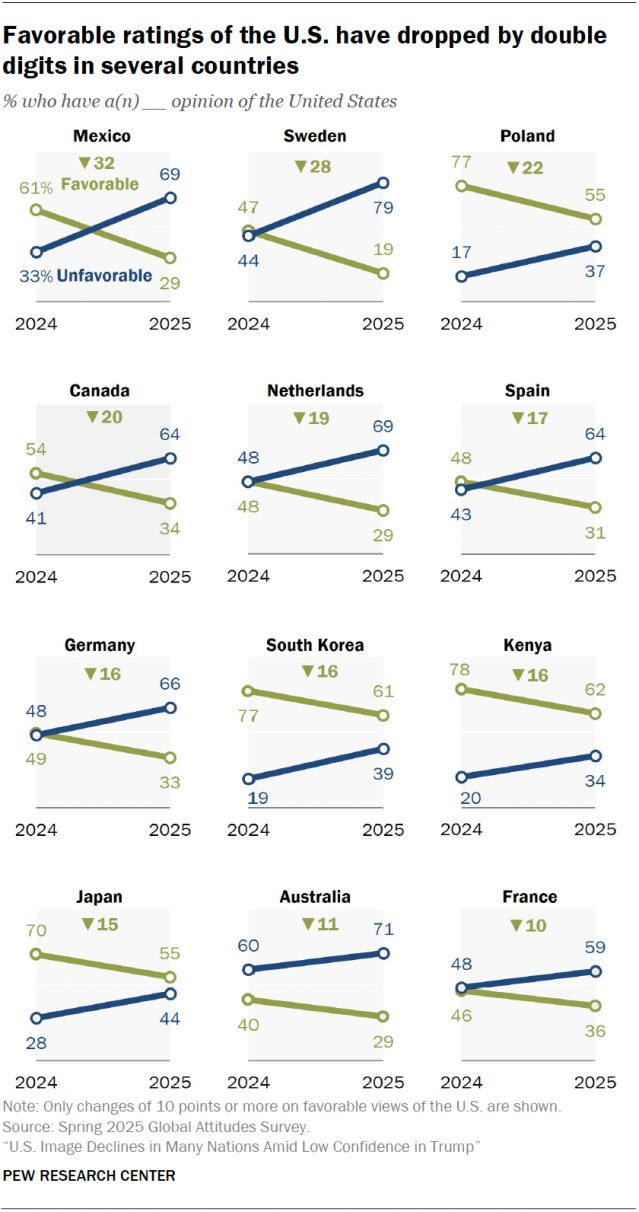
The U.S. receives its least positive assessment in Sweden, where 79% have a negative opinion of the country. More than six-in-ten adults view the U.S. negatively in neighboring Canada and Mexico, as do majorities in Australia, France, Germany, the Netherlands, Spain and Turkey.
Ratings of the U.S. have dropped significantly in 15 countries since last year. One of the largest decreases is in Mexico, where 29% have a favorable view, compared with 61% in 2024.
Canadians have also become much less likely to view the U.S. favorably (34% vs. 54% in 2024).
Views of the U.S. have not changed significantly since last year in Argentina, Greece, Hungary, India, South Africa and the UK.
And in Israel, Nigeria and Turkey, the share with a positive opinion of the U.S. has increased since last year. Despite this rise in favorability, Turkey still has one of the most negative assessments of the U.S., with only a quarter of adults viewing the country favorably.
Views by age
In most countries surveyed, adults under 35 have a more positive opinion of the U.S. than those ages 50 and older. One of the largest age gaps is in Brazil, where 73% of younger adults view the U.S. favorably, compared with 37% of older adults. There is also a large difference in Turkey (42% vs. 13%).
Views by ideology
People who place themselves on the ideological right tend to rate the U.S. more favorably than those on the left. In Israel, for example, 97% of those on the right have a positive opinion of the U.S., compared with 55% of people on the left. (Notably, 51% of Israelis place themselves on the ideological right, a relatively large share compared with most other nations surveyed.) There is also a large ideological divide in Australia, where 60% of those on the right view the U.S. positively, compared with 12% of those on the left.
Views by right-wing party support
In Europe, people with a favorable opinion of right-wing populist parties are especially likely to view the U.S. positively. For example, 63% of Alternative for Germany (AfD) supporters express a favorable view of the U.S., compared with 25% of Germans who do not support AfD. (For more on how we define populist parties, read Appendix B).
Outside Europe, supporters of some right-wing parties also hold more favorable views of the U.S. For example, nearly seven-in-ten Argentines who support La Libertad Avanza – the party of President Javier Milei – rate the U.S. positively, compared with 37% of nonsupporters. U.S. favorability is also particularly high among supporters of former Brazilian President Jair Bolsonaro’s Liberal Party, Israeli Prime Minister Benjamin Netanyahu’s Likud Party and former South Korean President Yoon Suk Yeol’s People Power Party.
Do people see the U.S. or China as the top global economy?
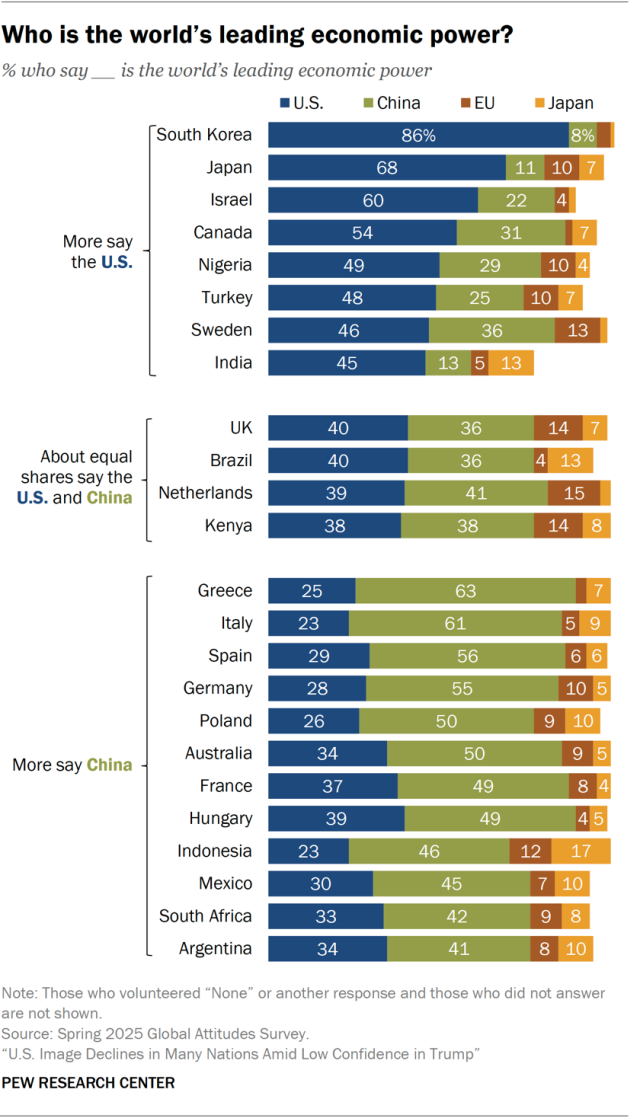
When asked which is the world’s top economic power – the U.S., China, Japan or the countries of the European Union – people in eight countries tend to name the U.S. More say China is the top economy in 12 countries. And in four, about equal shares name the U.S. and China. Relatively few name the EU or Japan as the leading economic power.
More than eight-in-ten adults in South Korea, and roughly two-thirds in Japan, consider the U.S. the world’s top economy. Roughly half or more in Canada, Israel, Nigeria and Turkey agree.
In most European and Latin American countries surveyed, people say China is the global economic leader, including roughly six-in-ten in Greece and Italy.
The share saying the U.S. is the top economic power has decreased in eight countries, including five in Europe, since this question was last asked in 2023: Australia, France, Germany, Greece, Indonesia, Italy, Mexico and Spain. In these countries, except Australia and Italy, the share naming China as the top economy has increased.
Views of China as the world’s leading economic power have also increased since 2023 in Argentina, Brazil, Kenya and South Africa.
Canada is the only country where more people view the U.S. as a global economic leader now than in 2023 (+10 points).
Views of democracy in the U.S.
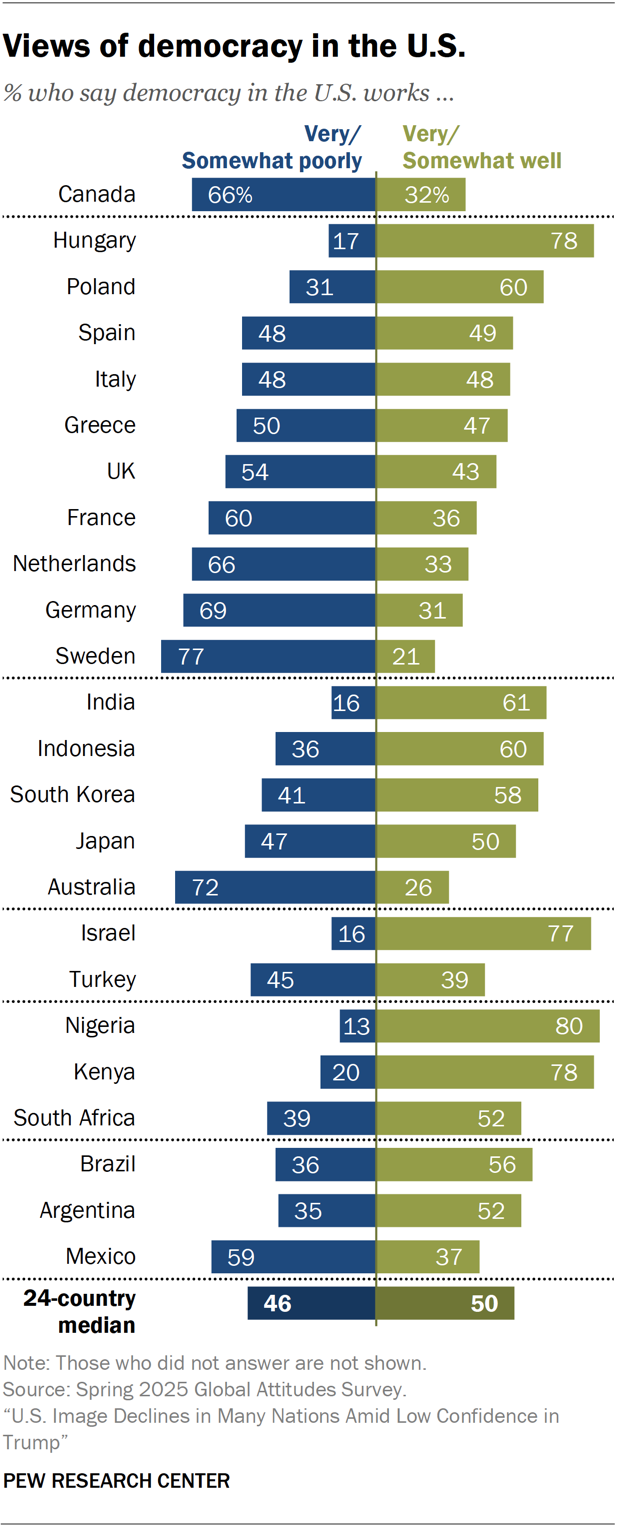
The U.S. was one of many countries that held an election in 2024. Following that election, people outside of the U.S. are roughly split on whether its democracy is working well or not.
Adults in Hungary, Israel, Kenya and Nigeria have the most positive views of U.S. democracy, with roughly three-quarters or more saying it works well. And majorities in Brazil, India, Indonesia, Poland and South Korea agree.
But roughly half or more in most European countries, Australia, Mexico and Canada say democracy in the U.S. is functioning poorly. And in Australia, Canada, Mexico, the Netherlands and Sweden, around a third say U.S. democracy is working very poorly.
This is the first time we have asked this particular question, but previous Center surveys have also found ambivalent views of American democracy. People around the world generally say the U.S. is at least as democratic and politically stable as other wealthy countries. But many say democracy in the U.S. is no longer a good example for other countries to follow.
Views by gender
In in most countries surveyed, men are more likely than women to think democracy in the U.S. is working well.
In Spain, for example, 59% of men and 39% of women rate the functioning of democracy in the U.S. positively. In some countries, men are also more likely than women to provide an opinion.
Views by ideology
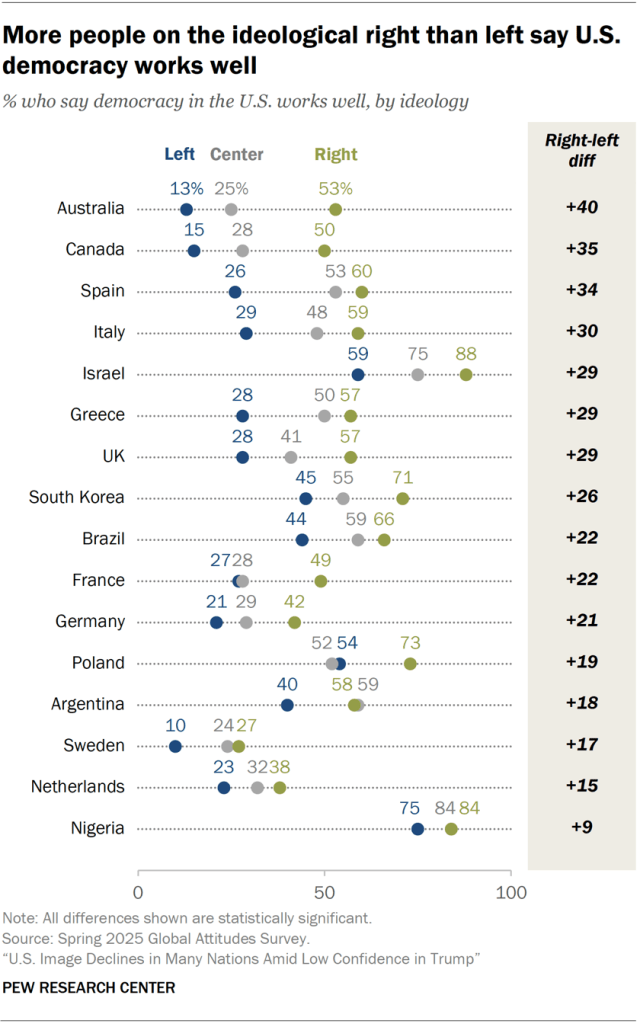
As with overall views of the U.S., people who place themselves on the ideological right are more likely than those on the left to give a positive assessment of American democracy.
One of the largest ideological gaps is in Australia, where 53% of those on the right say U.S. democracy works at least somewhat well, compared with 13% of those on the left. Ideological divides of 15 points or more can be seen in many other countries.
Turkey is the only country surveyed where people on the left are more likely than those on the right to rate U.S. democracy positively (49% vs. 28%).
Views of partisan conflict in the U.S.
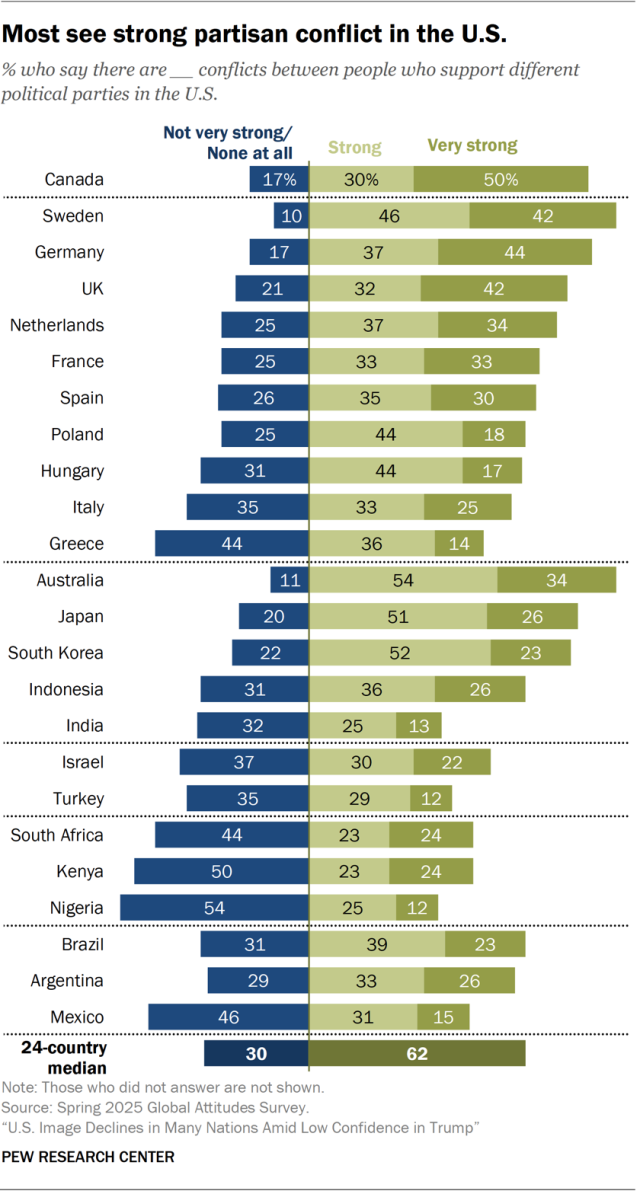
Although people are divided on how well they think American democracy is working, there is general agreement across 24 countries that there are strong partisan conflicts in the U.S.
A median of 62% say conflicts between people who support different political parties in the U.S. are strong or very strong, while 30% say partisan conflicts are not very strong or that there are no conflicts at all.
A third of adults or more in Australia, Canada, France, Germany, the Netherlands, Sweden and the UK see very strong partisan conflicts in the U.S.
Half or more in Kenya and Nigeria believe there are weak or no partisan conflicts. More than four-in-ten agree in Greece, Mexico and South Africa.
We last asked this question in spring 2022, roughly a year after Trump supporters stormed the U.S. Capitol in response to the 2020 presidential election results.
Since then, there has been a decrease in some countries in the share who see strong partisan conflicts in the U.S. For example, 52% of Israelis now say there are strong or very strong conflicts between people who support different political parties, compared with 66% in 2022. There have been similar or smaller decreases in Canada, France, Greece, Italy, the Netherlands and the UK.
Views by age
Adults under 35 in many countries are more likely to see deep partisan divisions in the U.S., when compared with those ages 50 or older. Greece is a good example of this age gap: 66% of younger adults and 41% of older adults see strong conflicts between people who support different U.S. political parties.




